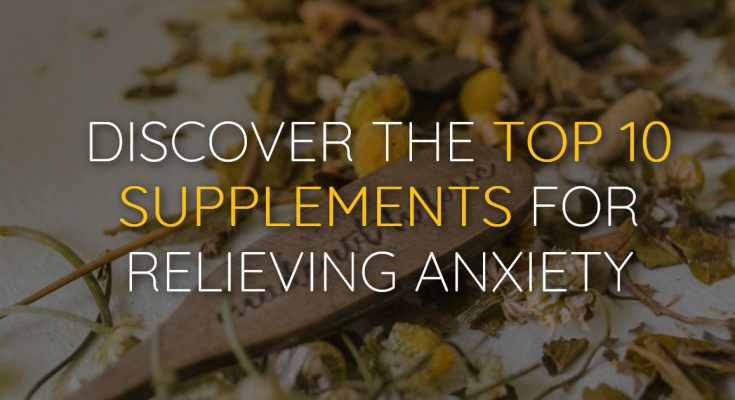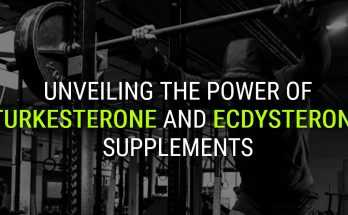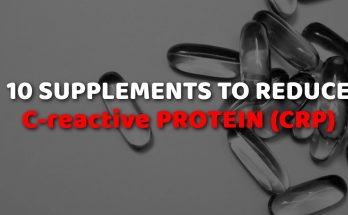In a world that often feels overwhelming, it’s become essential to find natural and effective ways to manage anxiety.
There are a plethora of natural herbs, botanicals and dietary supplements which scientific research ha found to possess significant anti-anxiety properties.
In this article, we are going to explore ten natural supplements with the strongest evidence-based for relieving anxiety.
1. Chamomile – The Popular Nervine Herbal Tea Which Helps Generalized Anxiety Disorder (GAD)
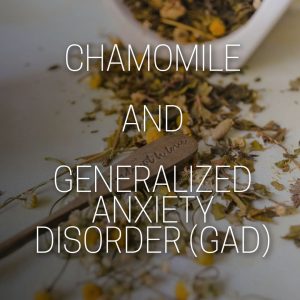
Chamomile stands out as a time-honoured, gentle nervine herb for calming nerves and promoting a sense of relaxation.
Chamomile is bursting with an array of potent phytochemicals that work synergistically to promote relaxation and calmness.
One of the primary constituents is apigenin, a flavonoid known for its anxiolytic properties.
So next time you find yourself in the midst of an anxious moment, grab a cup of chamomile tea and let its soothing constituents guide you towards a tranquil state of mind.
The scientific research has found:
Chamomile appears to be efficacious and safe for sleep quality and generalized anxiety disorders (GADs). – [1]
2. Magnesium Supplements – The Calming Anti-Anxiety Mineral
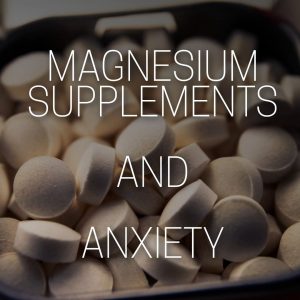
Magnesium deficiency can be an overlooked factor when it comes to managing anxiety disorder.
This vital mineral is involved in over 300 biochemical reactions within our bodies, including regulating neurotransmitters responsible for mood regulation.
Magnesium is often referred to as nature’s relaxation mineral due to its calming effects on the body and mind
Anxiety and magnesium deficiency often go hand in hand.
Low magnesium levels can lead to a hyper-reactive stress response in the brain, causing people to feel more anxious and restless.
Additionally, magnesium has been found to enhance sleep quality, a crucial factor in managing anxiety.
A summary of the latest scientific evidence on magnesium supplements and anxiety has found:
Magnesium supplementation may reduce anxiety in adults with chronic mild-to-moderate anxiety (SOR: B, low-quality randomized controlled trials [RCTs]).
Magnesium supplementation may also reduce anxiety in adults with chronic severe anxiety (SOR: C, two conflicting small RCTs). – [2]
Existing evidence is suggestive of a beneficial effect of Mg on subjective anxiety in anxiety vulnerable samples. – [3]
3. Passionflower
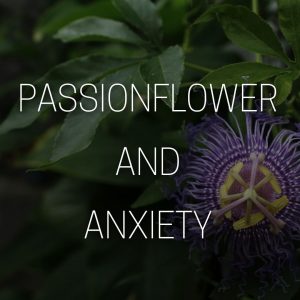
Passionflower, scientifically known as Passiflora incarnata, is a climbing vine found primarily in North and South America.
Passionflower herb boasts potent compounds such as flavonoids, alkaloids, and glycosides that contribute to its calming effects on the body and mind.
These compounds have been shown to modulate the γ-aminobutyric acid (GABA) system and enhance the production of gamma-aminobutyric acid (GABA), a neurotransmitter responsible for reducing brain activity, thereby helping to alleviate anxiety symptoms.
Research has confirmed that Passionflower has a comparable anti-anxiety effect to many conventional anxiety medications such as Oxazepam, but without the side effect profile.
Passiflora extract is effective in the treatment of systemic anxiety; additionally, there is a low incidence of impairment of work efficiency with Passiflora extract, as compared to oxazepam.
The anti-anxiety effect of Passiflora incarnata is comparable to drugs such as oxazepam or midazolam. – [4]
4. L-Theanine
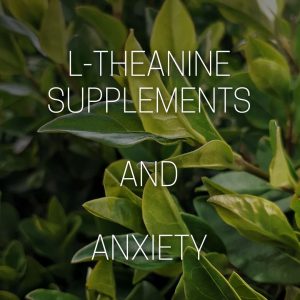
L-Theanine is a unique non-protein, amino acid found primarily in tea leaves (Camellia Sinensis), particularly green tea.
L-Theanine is an amino acid known for its ability to promote relaxation and reduce stress levels without inducing drowsiness.
By modulating neurotransmitters in the brain, it enhances alpha brain waves, fostering a state of calm and focus.
A summary of the latest scientific evidence on L-Theanine supplements for reducing stress and anxiety has found:
Our findings suggest that supplementation of 200-400 mg/day of L-THE may assist in the reduction of stress and anxiety in people exposed to stressful conditions. – [5]
The findings in four studies indicated significant improvements in reducing stress and anxiety.
L-THE supplementation can assist in reducing acute stress and anxiety in people experiencing stressful situations. – [6]
5. Ashwagandha – “Indian Ginseng” – The Ayurvedic Adaptogen Herb For Anxiety & Stress
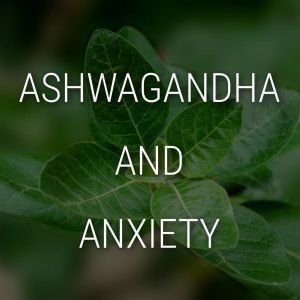
Ashwagandha, known as Withania somnifera and “Indian Ginseng”, is an ancient herb that has long been a staple of Ayurvedic medicine.
Used traditionally in India for centuries, this powerful adaptogenic herb is known for its rejuvenating and calming properties.
One of the key factors contributing to anxiety is an imbalance in stress hormones, particularly cortisol.
Research has found that Ashwagandha may help to control cortisol levels, thereby reducing stress and anxiety.
Ashwagandha has also been shown to possess GABA-mimetic activity.
A systematic review and meta-analysis of randomized controlled trials published 2022 evaluated the effect of Ashwagandha supplementation on anxiety as well as stress, concluding:
We found that Ashwagandha supplementation significantly reduced anxiety and stress level compared to the placebo.
The current systematic review and dose-response meta-analysis of RCTs revealed a beneficial effect in both stress and anxiety following Ashwagandha supplementation. – [7]
6. CBD (Cannabidiol) Oil
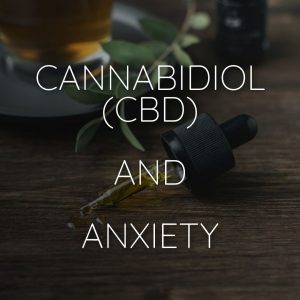
In the constant search for natural remedies, CBD oil supplements have recently gained massive attention for their potential in treating anxiety.
CBD, short for cannabidiol, is a natural compound derived from the hemp plant.
Unlike its notorious cousin, THC, CBD does not induce psychoactive effects.
Instead, it interacts with our body’s endocannabinoid system, responsible for maintaining various bodily functions, including mood regulation and stress response.
Studies suggest that CBD possesses anxiolytic properties that may support a sense of calm and tranquillity.
We found that existing preclinical evidence strongly supports CBD as a treatment for generalized anxiety disorder, panic disorder, social anxiety disorder, obsessive–compulsive disorder, and post-traumatic stress disorder when administered acutely.
Overall, current evidence indicates CBD has considerable potential as a treatment for multiple anxiety disorders, – [8]
Results provide preliminary evidence supporting efficacy and tolerability of a full-spectrum, high-CBD product for anxiety.
Patients quickly achieve and maintain symptom reduction with few side effects. – [9]
Recommended Product: Orange County CBD
7. Lavender Oil (Silexan)
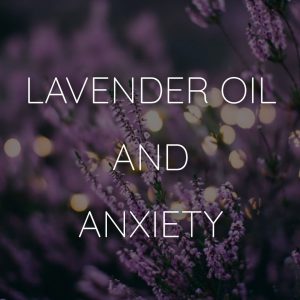
One natural remedy that has a long history of being used to postively impact mood, reduce anxiety and improve sleep is Lavender essential oil.
Lavender oil is commonly used aromatherapy practices due to its ability to promote relaxation and reduce anxiety levels.
By simply inhaling its delightful aroma, you can experience an immediate sense of calmness, making lavender oil an accessible and convenient form of anxiety relief.
Silexan®, a proprietary essential oil manufactured by steam distillation from Lavandula angustifolia flowers showed pronounced anxiolytic effects in patients with subthreshold anxiety disorders and was also efficacious in patients with Generalized Anxiety disorder (GAD). – [10]
The latest summary of the scientific evidence on Silexan for the treatment of anxiety has found:
Silexan is a safe and effective treatment in anxiety disorders. – [11]
Silexan displayed a significant effect on anxiety, and possibly benefitted the treatment of depression and insomnia. – [12]
This meta-analysis demonstrates that Silexan exerts significant anxiolytic effects in subthreshold anxiety, GAD and MADD that were consistently reflected in investigator ratings and patient-reported outcomes, including improvement of health-related life-quality, while showing favorable tolerability and safety. – [13]
8. Rhodiola Rosea – The Adaptogenic Herb For Mild Anxiety & Protecting Against Stress
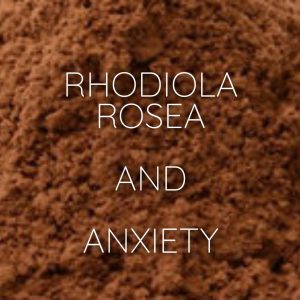
Native to the cold regions of Europe and Asia, Rhodiola Rosea is a herb that has been used for centuries in traditional Russian and Chinese medicine systems.
Also known as the “golden root,” this adaptogenic herb boasts an array of potential benefits, including reducing anxiety symptoms and promoting overall well-being.
Numerous studies have highlighted the remarkable qualities of Rhodiola Rosea in combating anxiety.
Its ability to modulate the stress response in the body as an “adaptogen” and regulate cortisol levels makes it an ideal candidate for managing anxiety-related symptoms.
By enhancing the body’s adaptability to stressors, Rhodiola Rosea helps promote a more balanced state of mind.
Apart from its anxiety-reducing properties, Rhodiola Rosea has also shown promise in enhancing mental performance.
It’s ability to improve focus, concentration, and cognitive function can bring a sense of clarity and sharpness to individuals experiencing anxiety-related brain fog.
A systematic review published 2020 examined the effects of R. rosea on depression, anxiety and mood, as these are the most relevant to mental health.
In these studies, R. rosea seems to improve the symptoms of mild to moderate depression, symptoms of mild anxiety and to enhance mood.
Rhodiola rosea supplementation may alleviate symptoms of mild to moderate depression and mild anxiety, while it may also enhance mood. – [14]
9. Lemon Balm
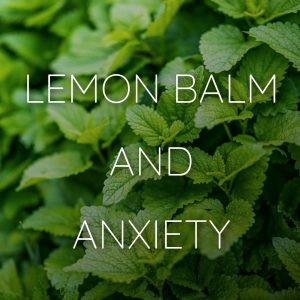
Lemon balm (Melissa officinalis) is a perennial herbaceous plant in the mint family.
With its zesty lemon uplifting aroma, Lemon Balm has a long traditional history of medicinal usage, which is said to date back well over 2000 years being used as a “nervine” herb for all complaints related to the nervous system.
Modern clinical research has found Lemon Balm to exert mild sedative and anxiolytic effects.
A systematic review and meta-analysis published 2021 investigated the effects of lemon balm as a medicinal herb on anxiety and depression in clinical trials and its side effects.
The systematic review and meta-analysis found:
Based on meta-analysis results, lemon balm significantly improved mean anxiety and depression scores compared with the placebo (SMD: -0.98; 95% CI: −1.63 to −0.33; p = 0.003), (SMD: -0.47; 95% CI: −0.73 to −0.21; p = 0.0005) respectively, without serious side effects.
Current evidence suggests that lemon balm may be effective in improving anxiety and depressive symptoms, particularly in the acute setting. – [15]
10. Saffron – The Spice With Anti-Depressant & Anti-Anxiety Mood Boosting Benefits!
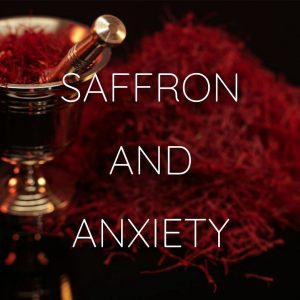
Saffron (Crocus sativus L.) has a long-standing history as an essential ingredient in culinary and traditional medicine, with recent scientific studies shedding light on it’s mood regulating benefits.
Renowned as the most expensive spice in the world, modern clinical research has found Saffron to possess significant anti-depressant and anti-anxiety activity.
Packed with powerful compounds like crocin and safranal, saffron has been shown to exhibit antioxidant and anti-inflammatory properties that contribute to its anxiety-reducing effects.
Both oxidative stress and inflammation have been shown to play a role in the pathophysiology of anxiety disorders.
A latest summary of research on Saffron for improving symptoms of anxiety has found:
Twenty-three studies were included. Saffron had a large positive effect size when compared with placebo for depressive symptoms (g = 0.99, P < 0.001) and anxiety symptoms (g = 0.95, P < 0.006).
Saffron also had a large positive effect size when used as an adjunct to antidepressants for depressive symptoms (g = 1.23, P = 0.028). Egger’s regression test found evidence of publication bias.
Saffron could be an effective intervention for symptoms of depression and anxiety; however, due to evidence of publication bias and lack of regional diversity, further trials are required. – [16]
Consumption of saffron resulted in a significant reduction in Beck Depression Inventory (BDI) (11 studies with 12 effect size) (WMD: −4.86; 95 % CI: −6.58, −3.14), Beck Anxiety Inventory (BAI) (5 studies) – [17]
References
[2] Does magnesium supplementation decrease anxiety in adults?
[3] The Effects of Magnesium Supplementation on Subjective Anxiety and Stress-A Systematic Review
[4] Passiflora incarnata in Neuropsychiatric Disorders—A Systematic Review
[6] Theanine consumption, stress and anxiety in human clinical trials: A systematic review
[8] Cannabidiol as a Potential Treatment for Anxiety Disorders
[11] Silexan in anxiety disorders: Clinical data and pharmacological background
[12] Medicinal herbs for the treatment of anxiety: A systematic review and network meta-analysis
[14] The effects of Rhodiola Rosea supplementation on depression, anxiety and mood – A Systematic Review
The information in this article has not been evaluated by the FDA and should not be used to diagnose, cure or treat any disease, implied or otherwise.
Always consult with a qualified healthcare professional before making any significant dietary or lifestyle changes including supplements and herbs.
